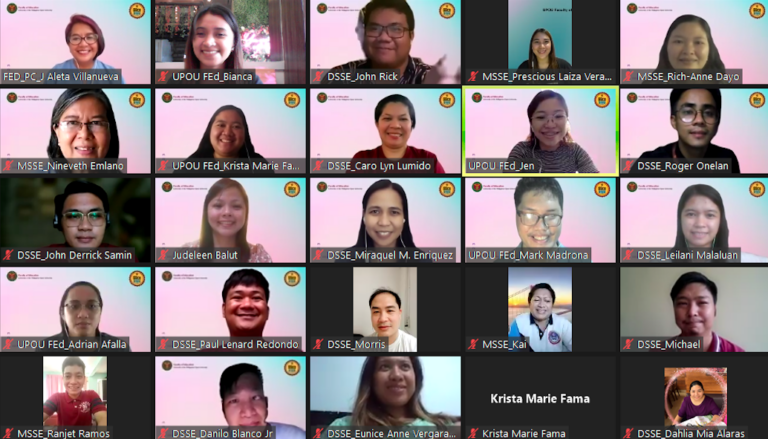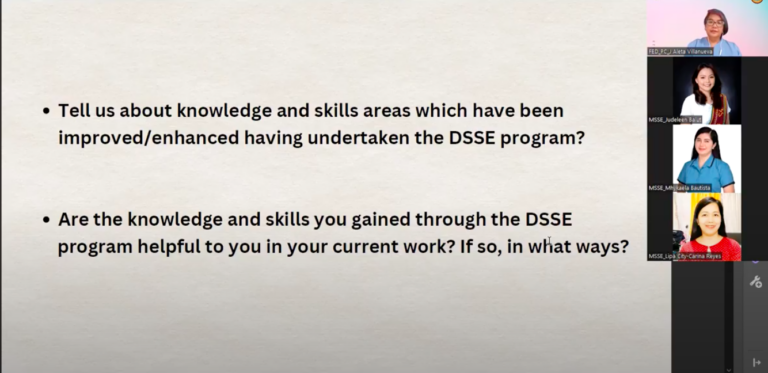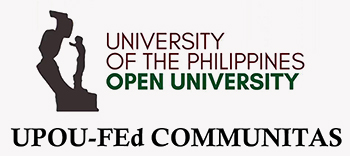About Dip/MASSE Program and Academic Concerns
At the start of the program, Dr. Villanueva shared some important links about the Dip/MASSE program and the Faculty of Education in general. She also presented general academic advice for the students such as (1) having 3-6 units per semester especially for students working full time, (2) aiming for quality engagement over mere passing mark, hence keeping a realistic course load per sem; and (3) finding an effective study routine by dedicating a specific time to read, think, and write. Furthermore, she encouraged the research students to work in study groups and consistently schedule one-on-one consultations with the program chair or faculty-in-charge for their research topic proposal writing.
On instances wherein the students lose track of their academics due to various reasons, Dr. Villanueva advised them to file for Leave of Absence (LOA) or drop the course rather than opting for Absence without Leave, since the latter result in a readmission process which may take more time. She urged the students to always prioritize their mental health and wellbeing, reassuring them that the program will always be around until such time when personal life circumstances prove to be more favorable.

Sharing of MASSE Capsule/Project Proposals
Two (2) MASSE students presented their capsule and project proposals simultaneously –Ms. Rich Anne Dayo, currently a MASSE student, focused her project proposal presentation on teacher’s experiences in improving learning applications. Ms. Dayo intends to explore the learning applications occurring in a real-life classroom setting. She explained that her personal reason as a student-teacher greatly influenced her to arrive at her Special Problems project proposal. According to Ms. Dayo, the project could contribute to social studies teaching methodology in the form of reflections. It was steered by recommendations, contradictions, and gaps found in prior literature on Social Studies teaching Methodology. Moreover, with the help of this project, she will be able to enhance the self-reflection tool using her experiences in learning action cells and seminars.
As for one more proposed research study, Ms. Nineveth Emlano talked through her capsule proposal focusing on the TPACK instrument or the Technological, Pedagogical, and Content Knowledge. According to Ms. Emlano, educational institutions must take steps to ensure that their graduates possess the requisite content and pedagogical knowledge to become effective social studies teachers.
Ms. Emlano shared that she began this project way back in 2017 and recently returned to working on it after four years, to which Prof. Villanueva responded by reassuring everyone that research conceptualization and the writing involved is a journey in itself. Some studies may take longer than others, however, what matters the most will always be the quality of the work and foreseen practical and intellectual contribution. She also recommended that students try to consider varying perspectives instead of sticking to a hard-held world view – to enhance or deepen their understanding of their research topics.
Focus Group Discussions: Dip/MASSE Program Check-Up
Proceeding to the last agenda, the participants were asked to engage in their respective breakout rooms to talk about the students’ gained experiences from taking the Diploma Program. The discussion was guided by the following questions:
Are the knowledge and skills you gained through the DSSE program helpful to you in your current work? If so, in what ways?
Did you experience any kind of promotion or additional workload or change in job title/ position which can be attributed to your DSSE degree? What were these in case?
Any change in values and mindsets?
What comments and suggestions do you have to help improve the DSSE program?

The discussion centered on the gains and benefits of the participants taking part in the Diploma in Social Studies program and proceeding to the Masters degree at UPOU. The students are able to see the direct application of the program and immediately put their learnings into practice in the classroom setting where they teach. They are likewise appreciative of their research advisers and the program chair for their practical and academic inputs in the research course/s and mentoring sessions.
In terms of the knowledge gained, the students shared their common sentiments on learning proper citations and effective RRL writing. The program became a huge refresher as it covered some of the overlooked topics during their undergraduate degree. Most importantly, through the SSE courses and facilitation, the students were guided through the features and real-life experience of online teaching and learning which filter to the kind of teaching they undertake with their own students.
Careerwise, one of the participants shared a success story attributed to her DSSE degree. As stated in a Department of Education (DepEd) memorandum, the DSSE program is considered as an equivalent to MA programs in other local HEIs. She elaborated on the positive changes in her profession:
“When I joined UPOU, I was a teacher 1 and after I graduated from DSSE, I was promoted from Teacher I to Teacher III. Now, I am a head teacher in a public school here in Zambales – all because of the DSSE Program”
Lastly, the focus group discussion also covered the limitations of the DSSE program and important suggestions for improvement. Some of the raised concerns were (1) request for additional topics to integrate in the program, and (2) the addition of research methodology as a separate course, with the aim of learning the specifics of statistics.
Written by: Jen Javier
